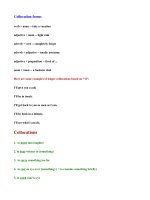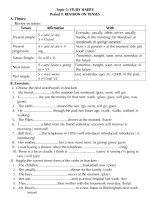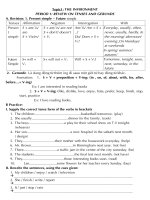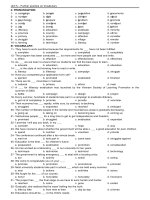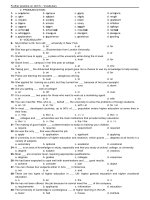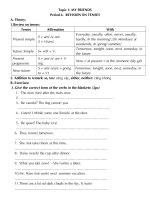EXERCISE on Tenses
Bạn đang xem bản rút gọn của tài liệu. Xem và tải ngay bản đầy đủ của tài liệu tại đây (218.51 KB, 19 trang )
CHAPTER TWO.
TENSES
CÁCH DÙNG CÁC THÌ . (THE USE OF TENSES)
Đê
̉
biểu thò thời gian và trạng thái của hành động được diễn đạt bằng động từ ngươ
̀
i ta du
̀
ng THÌ
(tenses). Động từ tiếng Anh có 12 thì (tenses) ở dạng chủ động. Để hiểu được hình thái của các thì, ta có thể
nghiên cứu cách chia động từ TO STUDY trong bảng dưới đây :
Simple Continuous Perfect
Perfect continuous
Present
- I (You / We /
They) study
- He (She / It)
studies
- I am studying
- He (She / It) is
studying
- You (We / They)
are studying
- I (You / We / They)
have studied
- He (She / It) has
studied
- I (You / We / They) have been
studying
- He ( She / It) has been
studying
Past
- I (You / He /
She / It / We /
They) studied
- I (He / She / It) was
studying
- You (We / They)
were studying
- I (You / He / She / It /
We / They) had
studied
- I (You / He / She / It / We /
They) had been studying
Future
- I (We) shall
study
- You (He /
She / it / They)
will study
- I (We) shall be
studying
- You (He / She / It /
They) will be
studying
- I (We) shall have
studied
- You (He / She / it /
They) will have
studied
- I (We) shall have been
studying
- You (He / She / It / They) will
have been studying
* 1. SO SÁNH THÌ SIMPLE PRESENT
VÀ THÌ PRESENT CONTINUOUS
Tiếng Anh có hai thì hiện tại mà đa số các em học sinh hay lẫn lộn cách sử dụng. Đó là thì hiện tại đơn
(Simple Present) và thì hiện tại tiếp diễn (Present Continuous).
* Thì Simple Present được dùng để chỉ một hành động diễn ra trong thời gian nói chung, không nhất
thiết phải là thời gian ở hiện tại. Thời gian nói chung là thời gian mà sự việc diễn ra mỗi ngày (every day), mỗi
tuần (every week), mỗi tháng (every month), mỗi năm (every year), mỗi mùa (every spring / summer / autumn
/ winter)…
- He goes to school every day. (Nó đi đến trường mỗi ngày)
- Mr.Brown travels every summer. (Hè nào ông Brown cũng đi du lòch)
* Thì Present Continuous được dùng để chỉ một hành động đang xảy ra (a current activity) hay một sự
việc chúng ta đang làm bây giờ (now/ at present/ at this moment), hôm nay (today), tuần này (this week), năm
nay (this year)…
- We are learning English now. (Bây giờ chúng tôi đang học tiếng Anh)
- Mary is playing the piano at the moment.
(Hiện giờ Mary đang chơi dương cầm)
Hãy so sánh : - I study in a bakery every day.(Tôi làm việc ở tiệm bánh mỗi ngày)
-I’m studying in a bakery this week.(Tuần này tôi đanglàm việc ở tiệm bánh).
* CHÚ Ý :
(1) + Thì Simple Present thường được dùng với các động từ chỉ tri giác (verbs of perception) như : feel
(cảm thấy), see (nhìn thấy), hear (nghe)… và các động từ chỉ trạng thái như : know (biết), understand
(hiểu), mean (có ý đònh), like (thích), prefer (thích hơn), love (yêu), hate (ghét), need (cần), want (muốn),
remember (nhớ), recognize (nhận ra), believe (tin)…
+ Ngoài ra chúng ta còn dùng thì Simple Present với động từ : be, appear (có vẻ), belong (thuộc về
ai), have to (phải)…
+ Thì Simple Present còn được dùng với các trạng từ chỉ tần suất lập đi lập lại (adverbs of
frequency) như : always (luôn luôn), usually (thường thường), often (thường), sometimes (đôi khi), seldom (ít
khi), generally (thường), rarely (hiếm khi), never (không bao giờ) …
- That child needs care. (Đứa bé đó cần sự chăm sóc)
- This book belongs to me. (Quyển sách này là của tôi)
- He never comes late. (Nó không bao giờ đến trễ)
+ Chúng ta cũng dùng thì Simple Present để chỉ một chân lý hay một sự thật hiển nhiên (a general
truth).
- The sun rises in the east. (Mặt trời mọc ở hướng đông)
- Nothing is more precious than independence and freedom.
(Không gì q hơn độc lập tự do)
(2) Thì Present Continuous còn được dùng để chỉ hành động ở một tương lai gần (a near future action)
và thường đi với các trạng từ chỉ tương lai như : tomorrow (ngày mai), next week (tuần tới), next month
(tháng tới), next year (năm tới), next summer (mùa hè tới) …
- I am going out tonight. ( Tối nay tôi sẽ đi chơi)
- My father is travelling to Japan next week.
(Ba tôi sẽ du lòch tới Nhật trong tuần tới)
Exercise I : Put the verbs in brackets in the present simple or the present continuous tense.
1/ My father (have) __________ coffee for breakfast every day.
2/ His sister (study) __________ in a shoe store this summer.
3/ The students (look) ___________ up that new word now.
4/ Mary (go) __________ to school every day.
5/ They (do) __________ this exercise at the moment.
6/ Ms Elen (read) ___________ a newspaper now.
7/ It (rain) __________ very much in the summer. It (rain) _________ now.
8/ Bad students never (study) __________ hard.
9/ He generally (sing) ________ in English, but today he (sing) ________ in Spanish.
10/ We seldom (eat) __________ before 6.30.
11/ She sometimes (buy) ___________ vegetables at his market.
12/ Be quiet. The baby (sleep) ____________.
13/ We always (do) ___________ our exercises carefully.
14/ Look. A man (run) ________ after the train. He (want) _______ to catch it.
15/ It (be) __________ very cold now.
16/ John (travel) __________ to England tomorrow.
17/ I (need) ____________ some money for my textbooks.
18/ Tom (like) __________ to go to the museums.
19/ Mary (love) __________ ice-cream.
20/ My mother (cook) __________ some food in the kitchen at present. She always (cook) __________ in
the mornings.
21/ I often (leave) __________ the city at weekends.
22/ The guests (watch) __________ the TV programmes now.
23/ I (see) ___________ you (wear) ___________ your best clothes.
24/ The sun (set)__________ in the west.
25/ My friend (study) __________ English for an hour every night.
26/ Listen. I (hear)___________ someone knocking at the front door.
27/ I (do) ____ an exercise on the present tense at the moment and I (think) ______ that I (know) _____how
to use it now.
28/ Honesty (be) __________ the best policy.
29/ The earth (go) __________ round the sun.
30/ Two and two (make) __________ four.
* 2 SO SÁNH THÌ PRESENT PERFECT VÀ THÌ SIMPLE PAST
* Thì Present perfect (Hiện Tại Hoàn Thành) được dùng để chỉ một quá khứ không rõ thời điểm và còn
liên lạc với hiện tại.
* Thì Simple Past (Quá Khứ Đơn) được dùng để chỉ một quá khứ có thời điểm rõ rệt cắt đứt với hiện tại.
+ CHÚ Ý :
(1) Thì Present Perfect thường đi với những từ như : up to now, up to the present, so far (cho tới
nay), not … yet (vẫn chưa), for, since, ever (đã từng), never, several times (nhiều lần), just (vừa), recently
(vừa mới), lately (mới đây) ...
- Have you ever seen a tiger ? (Bạn có bao giờ nhìn thấy cọp chưa)
- The train has not arrived yet. (Chiếc xe lửa vẫn chưa đến)
- We have lived here for six years.
(Chúng tôi đã sinh sống tại nơi đây được 6 năm)
- The bell has just rung. (Chuông vừa mới reo)
(2) * Thì Simple Past thường đi với những tiếng chỉ thời gian quá khứ xác đònh như : yesterday (ngày
hôm qua), the day before yesterday (ngày hôm kia), last week (tuần rồi), last month (tháng rồi), last year
(năm rồi), last summer (mùa hè rồi), ago (cách đây).
- We came here a month ago. (Chúng tôi đến đây cách đây một tháng)
- He went to the cinema yesterday. (Hôm qua nó đi xem phim)
* Thì Simple Past còn được dùng để chỉ một chuỗi các hành động kế tiếp xảy ra trong quá khứ.
- He closed all the windows, locked the doors and then went out.
(Nó đóng tất cả cửa sổ lại, khóa các cửa cái lại, rồi đi ra khỏi nhà)
Exercise II : Put the verbs in brackets in the present perfect or the simple past tense.
1/ We (never watch) __________ that TV programme.
2/ We (watch) __________ a good programme on TV last night.
3/ He (read) __________ that novel many times before.
4/ He (read) __________ that novel again last vacation.
5/ I (have) __________ a little trouble with my car last week.
6/ However, I (have) __________ no trouble with my car since then.
7/ I (not see) __________ John for a long time. I (see) __________ him 3 weeks ago.
8/ The school bell (ring) __________. We must go now.
9/ I (meet) __________ Mary last night. She (become) __________ a very big girl.
10/ He is very thirsty. He (not drink) __________ since this morning.
11/ It is very hot. Summer (come) __________.
12/ They (study) __________ at this school for 7 years now.
13/ They (begin) __________ to study at this school 7 years ago.
14/ Since when (you know) ___________ her ?
15/ How long ago (he start) __________ to learn French ?
16/ She (lose) __________ her handbag on the train yesterday morning.
17/ My mother (be) ______ in hospital for a long time and she cannot go home yet.
18/ His dog (just run) __________ out of the garden.
19/ Mr Brown (travel) __________ by air several times in the past.
20/ He (travel) ___________ to Mexico by air last summer.
* 3. SO SÁNH THÌ PRESENT PERFECT VÀ
THÌ PRESENT PERFECT CONTINUOUS
+ Thì Present perfect (Hiện Tại Hoàn Thành) được dùng để chỉ kết quả của một tình trạng ở hiện tại (the
result of the present state), một việc xảy ra trong quá khứ không rõ thời điểm, lập đi lập lại nhiều lần và kéo
dài đến hiện tại.
+ Thì Present Perfect Continuous (Hiện Tại Hoàn Thành Tiếp Diễn) được dùng để chỉ sự tiếp diễn của
một hành động (the continuity of an action) cho tới hiện tại.
- I have been waiting for two hours, but she has not come yet.
(Tôi đã chờ suốt hai tiếng nhưng cô ấy vẫn chưa đến)
- He has been living here since 1975. (Ông ấy đã sống ở đây từ năm 1975.)
- We have been studying in the garden all morning.
(Chúng tôi đã làm việc ở ngòai vườn suốt cả buổi sáng.)
+ Thì Present Perfect Continuous còn được dùng với các động từ như : lie (năm), wait (chờ đợi), sit
(ngồi), stand (đứng), study, learn (học), live (sống), rest (nghó nghơi), stay (ở)…
- They have been learning English since 1995.
(Họ đã học tiếng Anh liên tục từ năm 1995 đến nay)
-The chair has been lying in the store window for ages.
(Cái ghế này nằm ở trong tủ kính đã lâu lắm rồi)
Exercise III : Put the verbs in brackets in the present perfect or the present perfect continuous tense.
1/ I (try) __________ to learn French for years, but I (not succeed) _________ yet.
2/ She (read) _________ all the studys of Dickens. How many (you read) _________?
3/ I (wait) __________ here nearly half an hour for my girlfriend; do you think she (forget)
__________ to come ?
4/ Mary (rest) __________ in the garden all day because she (be) __________ ill.
5/ Although John (study) __________ at the University for 5 years, he (not get) __________ his degree
yet.
6/ Jack (go) __________ to Switzerland for a holiday. He (never, be) _____ there.
7/ We (live) __________ here for the last six months, and (just, decide) __________ to move.
8/ That book ( lie) __________ on the table for weeks. You (not read) ____ it yet ?
9/ He (not be) ___________ here since Christmas; I wonder where he (live) __________ since then.
10/ He (lose) ______ his books. He (look) ________ for them all afternoon, but they (not turn up)
_________yet.
11/ She (study) ___________ so hard this week that she (not have) ___________ time to go to the
cinema.
12/ Your hair is wet. (You swim) __________ for a long time ?
13/ Bill is still a bad driver although he (drive)__________ cars for six years.
14/ You look very tired. (You study) __________very hard ?
15/ The phone (ring) __________ for 2 minutes, but I (not answer) ________ it yet.
Exercise IV : Put the verbs in brackets in the present tenses.
1/ I (be) __________ sorry I (forget) __________ that fellow’s name already.
2/ Jack (look) __________ forward to his vacation next June.
3/ I (have) __________ no trouble with my English lessons up to now.
4/ Mr. and Mrs. Brown (be) ___________ in New York for 2 months.
5/ Michael (study) __________ 38 hours a week.
6/ At present, that author (write) ___________ a novel.
7/ George (do) __________ good study in this class so far.
8/ The weather( generally, get) __________ hot in July .
9/ You must wake her up. She (sleep) __________soundly for 10 hours.
10/ Listen! I (think) __________ someone (knock) __________ at the front door.
11/ How long (you learn) __________ English?
12/ That student (know) __________ all the new words very well now.
13/ Alice (lose) __________ her Vietnamese-English dictionary.
14/ Fred (just, graduate) __________ from Oxford University.
15/ The earth (circle) __________ the sun once every 365 days.
16/ That grandfather clock (stand) ________ there for as long as I can remember.
17/ That brown briefcase (belong) __________ to Dr. Rice.
18/ Jim (study) __________ on his report this year.
19/ Robert (wait) __________ for you since noon.
20/ That museum (stand) ___________ here for centuries.
21/ The sun (get) __________ very hot during the afternoon.
22/ Tom (buy) ___________ a new car next week.
23/ The boys and girls (go) ___________ home after this lesson.
24/ Davis (play) __________ football every afternoon.
25/ Up to the present, we (write) __________ almost every lesson in this book.
* 4. SO SÁNH THÌ SIMPLE PAST VÀ THÌ PAST CONTINUOUS
+ Thì Simple Past (Quá Khứ Đơn) được dùng để chỉ một hành động ngắn (thình lình) xảy ra trong quá khứ.
- I met him in the street yesterday. (Hôm qua tôi gặp hắn ta ở trên đường)
+ Thì Past Continuous (Quá Khứ Tiếp Diễn) được dùng để chỉ một hành động kéo dài trong quá khứ
tương ứng với một hành động khác cũng trong quá khứ.
- I met him while he was crossing the street. (Tôi đã gặp hắn ta khi hắn ta đang băng qua đường)
- She was going home when she saw an accident. (Cô ấy đang về nhà øthì cô ấy nhìn thấy một tai
nạn)
+ Thì Past Continuous còn diễn tả một hành động kéo dài tại điểm thời gian xác đònh ở quá khứ hoặc hai
hành động liên tiếp song song với nhau.
- My father was watching TV at 8 o’clock last night. (Vào lúc 8 giờ tối qua ba tôi đang xem TV.)
- I was doing my homestudy while my father was watching TV. (Tôi đang làm bài tập trong khi ba tôi đang
xem TV.)
Exercise V : Put the verbs in brackets in the past simple or the past continuous tense.
1/ He (sit) __________ in a bar when I (see) __________ him.
2/ When I (go) __________ out, the sun (shine) __________.
3/ The light (go) __________ out while I (have) __________ tea.
4/ When it (rain) __________ , she(carry) __________ an umbrella.
5/ We (walk) __________ to the station when it (begin) __________ to rain.
6/ He (teach) _______ English for 2 months when he (live)______ in Germany and (study) _______ as
a journalist
7/ The house (burn) ________ fast, so we (break) ________ the window to get out.
8/ He (eat) __________ three sandwiches while you (talk) __________ to him.
9/ The servant (drop) _______ two cups while she (wash up) ______ last night; neither of them
(break)_______
10/ While he (write) __________ a letter, the telephone (ring) __________; as he (go) __________ to
answer it, he (hear) __________ a knock on the door; the telephone (still, ring) __________ while he
(walk) __________ to the door, but just as he (open) __________ it, it (stop) __________.
* 5. SO SÁNH THÌ SIMPLE PAST VÀ THÌ PAST PERFECT
+ Thì Past Perfect (Quá Khứ Hoàn Thành) dùng để chỉ một hành động xảy ra trước một hành động khác
cũng trong quá khứ (past action).
- When he had finished his study, he went home. (Khi đã làm xong việc, nó trở về nhà)
-By the time I arrived at the station, the train had gone. (Vào lúc tôi đến nhà ga thì xe lửa đã chạy
rồi)
+ Thì Past Perfect còn diễn tả một hành động xảy ra trước một điểm thời gian xác đònh ở quá khứ.
- By 10 o’clock last night, I had gone to bed. (Tôi đã lên giường ngủ trước 10 giờ tối qua.)
Exercise VI : Put the verbs in brackets in the past simple or the past perfect tense.
1/ They (go) __________ home after they (finish) __________ their study.
2/ He (do) _________ nothing before he (see) ___________ me.
3/ He (thank) __________ me for what I (do) __________ for him.
4/ I (be) __________ sorry that I (hurt) __________ him.
5/ After they (go) __________ , I (sit) __________ down and (rest) __________.
6/ When I (arrive)___________, the dinner (already, begin) ______________.
7/ My friend (not see) _______ me for many years when I (meet) _____ last week.
8/ He (learn) __________ English before he (leave) __________ for England.
9/ In England, he soon (remember) __________ all he (learn) __________.
10/ They (tell) __________ him they (not meet) __________ him before.
11/ He (ask) __________ why we (come) __________ so early.
12/ She (say) __________ that she (already, see) ___________ Dr. Rice.
13/ By the time Bill (get) __________ there, the meeting (start) __________.
14/ When we (arrive) __________ at our place, we (find) __________ that a burglar (break)
____________ in.
15/ Almost everybody (leave) _______ for home by the time we (arrive) _______.
* 6. SO SÁNH THÌ PAST PERFECT VÀ THÌ PAST PERFECT CONTINUOUS
+ Thì Past Perfect Continuous (Quá Khứ Hoàn Thành Tiếp Diễn) dùng để nhấn mạnh tính liên tục của
hành động trước khi một hành động quá khứ khác xảy ra. Hãy so sánh :
- She had been studying English before she came here for classes. (Cô ấy đã liên tục học tiếng Anh trước
khi đến đây học).
- She had studied English before she came for classes. (Cô ấy đã học tiếng Anh trước khi đến đây học).
Và hãy so sánh :
- It had been raining when I got up this morning. (Mưa đã dứt khi tôi thức dậy.)
- It was raining when I got up this morning. (Mưa vẫn còn khi tôi thức dậy.)
Exercise VII : Put the verbs in brackets in the past simple or the past perfect continuous tense.
1/ I (ask) _________ him what he (do) __________.
2/ Tom (be) _________ tired. He (run) __________ for an hour.
3/ Although he (go) __________ to the doctor for 6 months, he (not, feel) __________ any better.
4/ The telephone (ring) _______ for 5 minutes before it (be) _________ answered.
5/ They (tell) __________ me you (live) __________ in London before the war.
6/ The poor man (wait) __________ for 6 hours before he (be) __________ brought into the room.
7/ By noon that day, we (drive) __________ for 5 hours.
8/ The robber who (watch) __ him running to the tree (sit) __down under its branches and (begin) ___to
attack him.
9/ I (ask) _______ her what she (do) _____ since she (arrive) _______ in England.
10/ She (tell) __________ me that she (study) __________ English literature.
* 7. SO SÁNH THÌ SIMPLE FUTURE VÀ THÌ FUTURE CONTINUOUS
+ Thì Simple Future (Tương Lai Đơn) diễn tả một hành động sẽ xảy ra (có hoặc không có thời gian xác
đònh ở tương lai); còn thì Future Continuous (Tương Lai Tiếp Diễn) diễn tả một hành động liên tiến tại điểm
thời gian xác đònh ở tương lai.
- He will go to the stadium next Sunday. (Chủ nhật tới tôi sẽ đến sân vận động)
- We will / shall have the final test. (Chúng tôi sẽ làm kiểm tra cuối cùng.)
Hãy so sánh :
- I will eat breakfast at 6 o’clock tomorrow. (Vào lúc 6 giờ sáng mai, tôi sẽ (bắt đầu) dùng bữa
điểm tâm.)
- I will be eating breakfast at 6 o’clock tomorrow. (Vào lúc 6 giờ sáng mai, tôi sẽ đang dùng bữa
điểm tâm.)
+ Trong các mệnh đề trạng từ chỉ thời gian (adverb clause of time) hay mệnh đề điều kiện (adverb clause
of condition), thì Simple Present được dùng để thay thế cho thì Simple Future.
- I shall not go until I see him. (Tôi sẽ không đi cho tới khi nào tôi nhìn thấy nó.)
- If he comes tomorrow, he will do it. (Nếu ngày mai nó đến, nó sẽ làm điều đó.)
+ Chú ý : WILL còn được dùng cho tất cả các ngôi.
Exercise VIII : Put the verbs in brackets in the simple present or the simple future tense.
1/ We (go) __________ out when the rain (stop) __________.
2/ I (stay) _________ here until he (answer) __________ me.
3/ Wait until I (catch) __________ you.
4/ I (be) _________ ready before you (count) _________ ten.
5/ John must eat his breakfast before he (go) __________ out.
6/ Miss Helen (help) __________ you as soon as she (finish) ________ that letter.
7/ He (tell) _________ you when you (get) __________ there.
